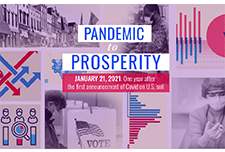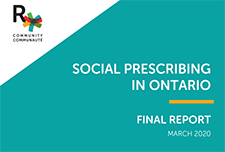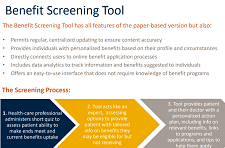Discover financial empowerment resources
Discover financial empowerment resources
The GetYourBenefits! Project began as an attempt to convince physicians that it is important to diagnose and treat poverty. This paper describes how information on accessing benefits has been communicated to physicians, health care providers, and those who work in public...

Financial stress is the root cause of many adverse health outcomes among poor and low-income children and their families, yet few clinical interventions have been developed to improve health by directly addressing patient and family finances. Medical-Financial Partnerships (MFPs) are novel...

The National Conference on Citizenship (NCoC) developed the Pandemic to Prosperity series. It builds on NCoC’s data infrastructure and advocacy network developed for its national Civic Health Index, with The New Orleans Index, which informed many public and private decisions and actions...

This report presents an analysis of the impact of COVID-19 on the nonprofit sector drawn from data collected in CCVO's Alberta Nonprofit Survey, data from surveys by the Alberta Nonprofit Network, Imagine Canada, and partner organizations across the country. The analysis in this report shows that...

Research has shown that even short-term isolation can have long-term impacts to mental health. Social and community supports are essential for vulnerable persons, especially during times of severe impacts to routine and imposed social distancing. This report discusses the findings of the Rx:...

The Collaborative to Advance Social Health Integration (CASHI) is composed of a community of 21 innovative primary care teams and community partners committed to increasing the number of patients, families and community members who have access to the essential resources they need to be healthy....

This brief is the fourth of a five-part series that highlights the need and opportunity for integrating financial capability services into social service programs. The goal of this integration is to improve overall financial outcomes that lead to financial security for low- and moderate-income...
This collaboration primer is a hands-on resource for organizations seeking concrete methods to create sustainable partnerships. This resource is based on the literature focusing on inter-agency collaboration and the experiences of a multi-stakeholder partnership for health promotion. The...
This report was conducted by the Manitoba Centre for Health Policy (MCHP) at the request of the Healthy Child Committee of Cabinet (HCCC) and Manitoba Health, Seniors and Active Living (MHSAL). It presents valuable current and cross-departmental information to inform the continued development,...
This report provides information on the results of Phase 1 of the Benefits Screening Tool project. Details on Phase 2 of the project (July 2016 to March 2018) are also included. The online Benefits Screening Tool (BST) enables health practitioners to screen patients for poverty and suggest...

There is much evidence that the quality of the social determinants of health Canadians experience helps explain the wide health inequalities that exist among Canadians. How long Canadians can expect to live and whether they will experience cardiovascular disease or adult-onset diabetes is very much...
In the spirit of social justice, the Commission on Social Determinants of Health was set up by the World Health Organization (WHO) in 2005 to marshal the evidence on what can be done to promote health equity, and to foster a global movement to achieve it. The Commission calls on the WHO and all...
Population health survey data are not routinely linked to specific health care organizations, limiting organizational capacity to assess performance improvements in relation to the observed risk and prevalence of differences in health. The lack of demographic information hinders the growth of...
This article explores benefits screening, a system of auditing patients to identify those living in poverty and the benefits they may be eligible for, as an innovative step towards realizing the right to health in Canada by advancing health equity. In particular, it assesses one online tool...
The Unequal City 2015: Income and Health Inequities report provides a summary of the details found in this technical document. These details include: The methodology used to explore current income-related health inequities in Toronto and the change in those inequities over time; The population...
In 2008, Toronto Public Health released The Unequal City: Income and Health Inequalities in Toronto. The report showed that there were differences in health between income groups in Toronto, that low income groups had worse health for most health status indicators, and that differences in health...
Large health care systems are beginning to invest core operating dollars in connecting their patients to community resources, in service of the ultimate solution to better costs and outcomes: keeping patients...
In this report we use a set of indicators that measure health risks, health care and health outcomes, and through these indicators we see the link between income and health – how income impacts health, and how health impacts income. The results reveal a tremendous opportunity to make life better...
